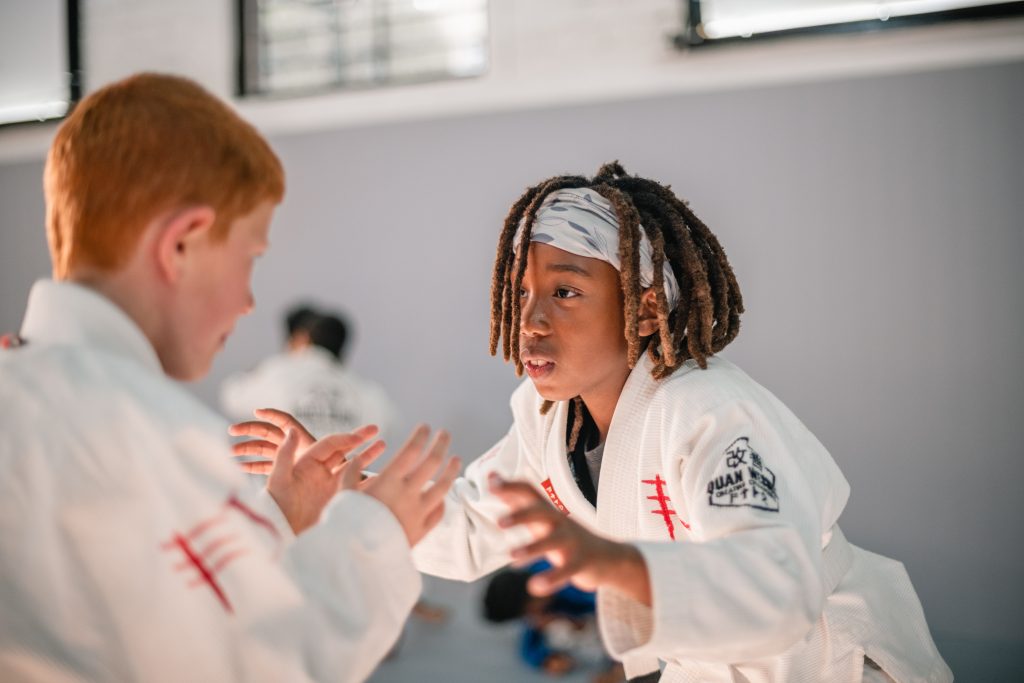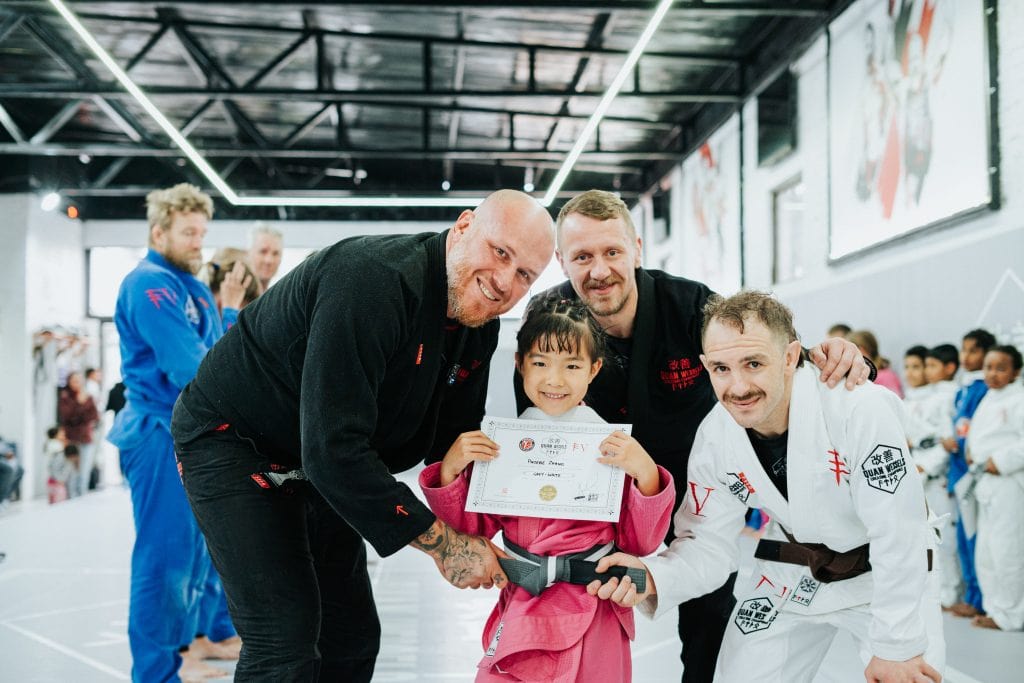Throwing your wee angel into the world of double-leg takedowns and wrestling can be daunting for any parent, so first off, here’s to you Mom or Dad for being brave! We all want our children to grow with skills to defend themselves and develop healthy habits, and while these are definitely outcomes of regular BJJ training there are also a world of other social, emotional and psychological benefits for your child.

First, let me give a short explanation of what exactly Brazilian Jiu Jitsu is. Brazilian Jiu-Jitsu (BJJ) is a martial art that focuses on grappling and ground fighting. It teaches techniques for controlling an opponent, using leverage and technique rather than strength, making it ideal for self-defence. The core of BJJ is learning how to defend yourself, escape from dangerous situations, and apply submissions like joint locks and chokes to safely neutralise an opponent. Whilst your baby may not be learning a Rear Naked Choke on the first day, they will be learning things like single and double-leg takedowns and the different positions in grappling such as mount and side-control.
QuanWessels Kids Structure
- Baby Champions Jiu Jitsu (3 – 6 yrs) 15:30 – 16:15
This is the class for our smallest of warriors. The Baby Jiu Jitsu class takes them through the simplest of the BJJ movements and teaches them the simplest of sequences with little to no finishes (the end submission like a choke or armbar) being taught. In this class, babies are matched according to size when it comes to drilling (so don’t worry about your 3-year-old being sat on by a 6-year-old) and are also given BJJ ‘games’ to play that help them get used to grappling scenarios and the physicality of the sport.
As someone who has watched this class grow, the greatest improvements I’ve seen have been in the motor skills, communication, confidence and social skills of the babies brought here. Most are very hesitant and quiet as they start, but as they build relationships with the other children and their coaches getting into all of the games the coaches play with them, their true love for the sport, for being active and for their peers emerges. They form bonds with all the staff here, and become akin to a small band of warriors.

- Junior Champions Jiu Jitsu (7 – 9 yrs) 16:15 – 17:30
This class teaches more advanced techniques and sequences to this age group, with far fewer games and tomfoolery than the baby’s class. Junior Champions do more live drilling with each other, and are given more responsibility than the babies. This class prepares them for the Teen Champions classes by honing their abilities to focus and understand technique – which are of vital importance not just in Jiu Jitsu but in life.
The Junior Champs class gives children within this age group more agency and responsibility, and in return they are taught more interesting and exciting submissions and sequences. Here they also begin to do live drilling where there is a winner and a loser. These kinds of scenarios build mental fortitude in children to try again after they lose and increase motivation and self-confidence which are essential to both competing in Jiu Jitsu and in life. The development here is ideal for progression to the Teen Champions classes where they are expected to focus, understand and be able to explain the technique they have been taught.

- Teen Champions (10 yrs +) 16:15 – 17:30
For our biggest of the young warriors we have the Teen Champions class. This class uses all the knowledge children have built up throughout the previous classes. Here, they learn sequences to completion, meaning from the entry, to the takedown, to gaining the dominant position and then to finish (submit) their opponent. While you may think these are scary things to learn for a child, it is better for them to be a warrior in a garden than a gardener in war. In life your children will be confronted by situations where their ability to control their emotions and act upon their awareness and analysis of the situation can keep them out of danger, as well as know how to defend themselves and escape.
Aside from the obvious physical benefits, teens in this class stand to gain many psychological and emotional benefits from training BJJ. The intense nature of the full contact classes allows any pent-up emotions to have a safe and regulated space to be let out and teaches children the value of discipline and self-control. Here they learn to walk the fine line between getting the submission whilst not seriously injuring their partner or themselves, and the correct reactions such as immediate release once an opponent taps and emotional regulation when they don’t get the outcome they wanted. This space also allows for the fostering of competitive spirit in a healthy way, and teaches them to fight with honour and respect for their opponents. The mental fortitude that is built from constantly wrestling up from a bottom position, or learning how to defend a choke, is unparalleled. Teens in this class build a great sense of camaraderie and respect for their peers who they train with, creating an inviting and warm environment for new children to enter into. It is beautiful and inspiring to watch through training, their progression from grumpy teenager to disciplined, focused young adult.

In conclusion, BJJ will help children become more resilient, build a better self image and confidence, courage, patience, respect for self and others. Jiu Jitsu training builds perseverance, team work, self awareness, proprioception, core-strength, grit, tenacity, social skills and mental toughness.
In today’s overstimulated world, BJJ allows kids to detach and decompress from mental and physical attachments to electronics and daily stresses, reprogramming neurological pathways to a more natural state of being.
BJJ runs in parallel with traditional school sports like soccer, cricket and rugby. BJJ is symbiotic and makes kids better at these sports, the skills they acquire on the mats stays with them for life. (all major sports teams like in rugby, the athletes do mma and BJJ). We are seeing it more and more with athletes attending our gym as they travel with their sports teams.
Lastly, it is worth pointing out that all the benefits outlined here also apply to yourself as parents. Some of the strongest parent-child relationships I have seen have been between those that share an activity or hobby such as Jiu Jitsu.

Still don’t believe me?
Don’t worry, here are a few links to studies done on children in BJJ and their various findings.
https://www.mdpi.com/2227-9067/9/8/1203 – A comprehensive study of school going children doing a variety of combat sports, showing that these sports improve the flexibility, strength, stamina, speed and agility of children.
https://www.theseus.fi/handle/10024/82420 – A study done to determine the effect of BJJ as a tool for social work to improve the lives of underprivileged school age children.
https://www.theseus.fi/handle/10024/82420 – A study done on school age boys in Abu Dhabi, comparing those doing BJJ to those just doing physical fitness.
See you on the mats soon!
